Unit 4 Language Study
- 格式:doc
- 大小:80.50 KB
- 文档页数:4
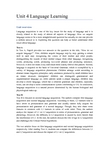
Unit4Language LearningUnit overviewLanguage acquisition is one of the key issues for the study of language and it is closely related to the study of almost all aspects of language.How we acquire language seems to be a most straightforward question but actually no one can provide a definite answer to it.Exploring this question can help us better understand other issues about language.Text AIn Text A,Napoli provides two answers to the question in the title,“How do we acquire language?”.First,children acquire language step by step,gaining a certain skill in each step:recognizing the voices of their mother and other people, distinguishing the sounds of their mother tongue from other language,recognizing words,producing words,producing two-word phrases and producing sentences. However,it does not mean every individual child exactly follows this pattern.Second, language is acquired on the basis of Universal Grammar,which is exemplified by a variety of language acquisition phenomena:Children arrange words according to abstract innate linguistic principles;early utterances produced by small children have an innate structure;immigrants’children can distinguish grammatical and ungrammatical language us;while parents speak a pidgin language,children may develop a creole language,which has a coherent grammar;and children,especially twins,can develop a secret communication system conforming to UG.In conclusion, language acquisition is a natural process determined by the human biological and physiological make-up.Text BText B is focused on second language acquisition.The authors compare first language acquisition and second language acquisition.According to them,L2learners tend to have errors in pronunciation and grammar and usually cannot fully acquire the pronunciation and grammar of a second language.Though,they also share some features in common with L1learners in terms of work order.Then,the authors analyze the impact of L1on L2acquisition in terms of pronunciation,grammar and phonology.However,the difficulty in L2acquisition is caused by more factors than the interference of L1.In the end,the authors discuss the role of age in L2acquisition and challenges the Critical Period Hypothesis.The two articles focus on first language acquisition and second language acquisition respectively.After reading Text A,students can compare the differences between L1 and L2acquisition and discuss the impact of L1on L2acquisition.Teaching objectivesReading skills●Summarize the main idea of each paragraph●Identify topic sentences and key words●Identify supporting detailsCommunicative competence●Illustrate your points with appropriate examples●Use topic sentences and supporting sentences to organize your presentation/essay ●Use euphemisms for possibly impolite expressionsCritical thinking●Use different examples to support different aspects of an idea●Use observation and literature to collect first-hand and second-hand evidence●Critique a“popular”folk theory with exemplification and reasoning Intercultural competence●Be aware of the differences and similarities between English and Chineseeuphemisms●Compare the Chinese language and the English language in terms of L1and L2learning●Understand the effects of cultural differences on communication and languagelearningTeaching strategiesYou can arouse the students’interest in this topic by showing them the Nature vs. Nurture debate,which is controversial in not only language acquisition but also psychology,education,law and popular culture.There is no definite answer to this debate but every student may have his or her own answer.After learning this unit, they will get new evidence or examples to support their answer or they may simply change their view.For a detailed description of child language acquisition,you can refer to Chapter8in Towards an Understanding of Language and Linguistics(《语言学概论》)by Lan Chun.Other resources include:●A general introduction/language.html●Emphasis on nature vs.emphasis on experience/news/special_reports/linguistics/learn.jsp●Language acquisition nguage learning/inservices/language_acquisiti_vs_language_02033.phpPreparatory work(1)Language Matters:A Guide to Everyday Questions About LanguageThis activity aims to arouse students’interest in other everyday questions about language which they often take for granted.They can also learn to search for an academic monograph on the Internet.The twelve questions answered by the author in the book are:●Question1:How do we acquire language?●Question2:From one language to the next:Why is it hard to learn a secondlanguage?Why is translation so difficult?●Question3:Does language equal thought?●Question4:Are sign languages real languages?●Question5:Do animals have language?●Question6:Can computers learn language?●Question7:Whose speech is better?●Question8:Why do dialects and creoles differ from standard language?●Question9:Do men and women speak differently?And who cares?●Question10:English spelling is hard,and it makes learning to read hard.Shouldwe do anything about it?●Question11:Should the United States adopt English as our official language andoverhaul our educational system accordingly?●Question12:Does exposure to and use of offensive language harm children?The book can be found on ,which also provides the second edition of the book with15questions about language.(2)Small children learning languageThis activity provides an opportunity for students to reflect on their personal experiences of learning language and collect some real examples of language learning, which can be analyzed during the reading of Text A.Relevant cases can also be found on the Internet,for example:/s?__biz=MzA5MzUxNTQ3Nw==&mid=206097261&id x=1&sn=ff8cb7a4119c131e3773e9f7d58d2fa6#rd(3)Universal GrammarThis activity is of great importance for understanding the second part of Text A. Definition:Universal Grammar proposes that the ability to learn grammar andlanguage is hard-wired into the brain.It is shared by all human languages.Chomsky argued that the human brain contains a limited set of rules for organizing language. Key publications of Chomsky:●Syntactic Structures,London:Mouton,1957.●Current Issues in Linguistic Theory,The Hague:Mouton,1964.●Aspects of the Theory of Syntax,Cambridge:M.I.T.Press,1965.●Language and Mind,New York:Harcourt,Brace&World,1968.●Studies on Semantics in Generative Grammar,The Hague:Mouton,1972.●The Logical Structure of Linguistic Theory,New York:Plenum Press,1975.●Lectures on Government and Binding:The Pisa Lectures,Dordrecht,Holland:Foris Publications,1982.●Some Concepts and Consequences of the Theory of Government and Binding,Cambridge:M.I.T.Press,1982.●Language and Thought,Wakefield,RI:Moyer Bell,1993.●The Generative Enterprise Revisited:Discussions with Riny Huybregts,Henkvan Riemsdijk,Naoki Fukui,and Mihoko Zushi,with a new foreword by Noam Chomsky,Berlin:Mouton de Gruyter,2004.For more information about Chomsky,please refer to the following website: /index.htm(4)Types of languageThis activity provides background information necessary for understanding different kinds of language mentioned by Napoli in Text A.Motherese/baby talk(Paragraph7):It is a nonstandard form of speech used by adults in talking to toddlers and infants.It features high pitch and special vocabulary,e.g. doggy for dog(Para.10),daddy for dad(Para.10),kitty for cat and wawa for water.A feature of baby talk in Chinese is reduplication,e.g.喝水水and吃饭饭。
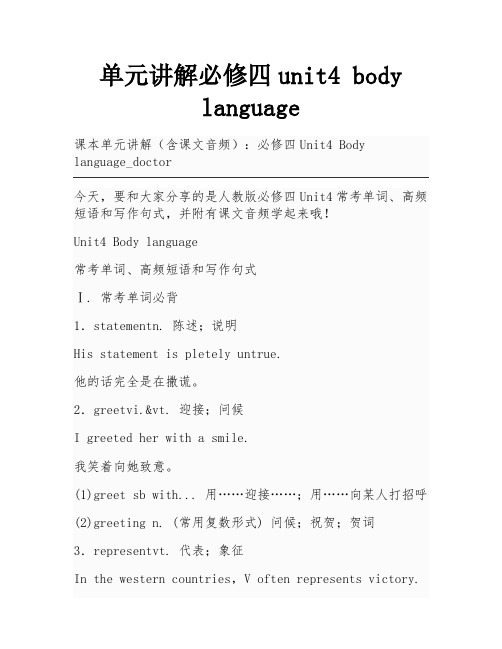
单元讲解必修四unit4 bodylanguage课本单元讲解(含课文音频):必修四Unit4 Body language_doctor今天,要和大家分享的是人教版必修四Unit4常考单词、高频短语和写作句式,并附有课文音频学起来哦!Unit4 Body language常考单词、高频短语和写作句式Ⅰ. 常考单词必背1.statementn. 陈述;说明His statement is pletely untrue.他的话完全是在撒谎。
2.greetvi.&vt. 迎接;问候I greeted her with a smile.我笑着向她致意。
(1)greet sb with... 用……迎接……;用……向某人打招呼(2)greeting n. (常用复数形式) 问候;祝贺;贺词3.representvt. 代表;象征In the western countries,V often represents victory.在西方国家,V常象征着胜利。
He represented himself as a doctor.他自称是一个医生。
[快速闪记](1)represent sth to sb 向某人说明某事,向某人传达某事represent...as... 把……描绘成……represent oneself as/to be... 自称是……(2)representative n. 代表4.curiousadj. 好奇的The children were curious to know what was happening over there.孩子们很想知道那边发生了什么事。
[快速闪记](1)be curious about 对(某事物)感到好奇be curious to do... 很想做某事;渴望做某事(2)curiously adv. 好奇地5.approachvt..&vi.接近;靠近;走近 n. 接近;方法;途径As summer approached,the weather became hotter and hotter.随着夏天的临近,天气越来越热。
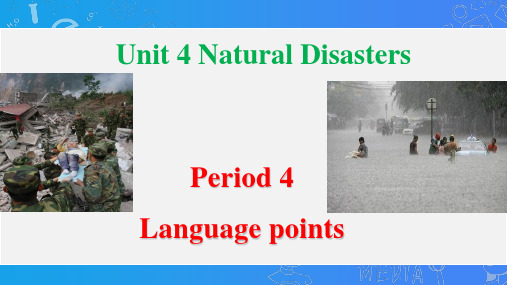
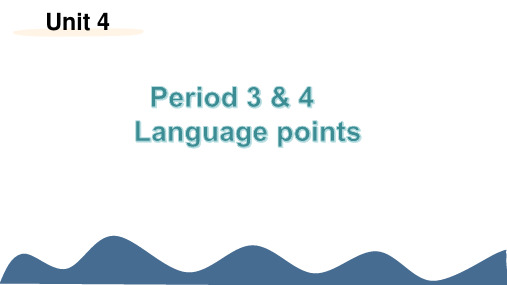

全新版⼤学英语综合教程第⼆册教案Unit4 Unit 4The Virtual WorldⅠ. Suggested Teaching PlanStudents will be able to1. understand the main idea (despite the many negative effects ofvirtual life, the author prefers it to real life) and structure of the text(contrast between virtual life and real life);2. learn some rules of interpreting new vocabulary and usage related tocomputers and the Internet in English;3. grasp the key language points and grammatical structures in the text;4. conduct a series of reading, listening, speaking and writing activitiesrelated to the theme of the unit.1st period2nd period3rd period4th period5th periodPre-reading While-reading(textorganization;languagepoints)While-reading(languagepoints;“find”structure;consequencesofvirtual life)Post-reading;Check onstudents’homereading(Text B)Theme-RelatedLanguageLearn-ing Tasks1. T asks Ss the following questions on the poem Surfing the Internet:(5minutes)* What was the hero doing when his boss came in? (surfing the Internet) * How did he act in front of his boss? (He pretended to be surprised at the computer which had crashed “unexpectedly”.)2. Ss look at the theme of this unit (The Virtual World) and the title of TextA (A Virtual Life), then try to: (10 minutes)* find antonyms of “virtual world” and “virtual life”; (real world, real life) * suggest synonyms for “virtual world”; (cyberspace, cyberia, etherworld, virtual reality, Internet world, net world, etc.)* say what people can do on the Internet, (communicating with people, shopping, reading, entertainment, education, working, hacking, publishing, etc.)3. Imaginative writing(28 minutes)1) T dictates to Ss the following paragraph:For the past two weeks, other participants of the Net Survival Contest (⽹络⽣存竞赛)and I have been shut up in bare hotel rooms.Our only link to the real world has been a computer that is hooked up to the Internet (联⽹电脑). We have relied on it, not only for food, bed sheets and other daily necessities, but also to set up an e-business (电⼦商务)of our own.2) Now Ss will complete the next paragraph beginning with: “Now it istime for me to walk out into the light of day again...” They willgive their imagination full play. They will write no more than 100words.3) Ss form groups of four to five, and read aloud to each other theirown writings.4) T asks some groups to recommend the best piece in their group tothe class.4. T may lead in to Text A by saying: Some of us like to live a life in contact with real things and real people, but others favora virtual existence. Which life is better? I’m sure you have different opinions. Now let’s read Text A to find out what Maia Szalavitz has to say about these two life styles. (2 minutes)1. Text organization (15 minutes)1) T draws Ss’ attention to Text Organization Exercise 1, and lets themread its instructions as well as what has already been done for them in this exercise.2) Ss try to complete the exercise by simply reading the first sentence ofeach paragraph in Text A.1) Ss compare answers with each other; if necessary, T may help.2. T explains the key language points and gives Ss practice (see LanguageStudy). (45 minutes)3. T guides Ss through Structure Exercise 2. (10 minutes)2. Ss re-read Paras 4-10, work in pairs to find out consequences of “my”virtual life. Can they use the “find oneself + adj./ past participle/present participle” structure when summing up the conse-quences? (10 minutes)3. Some pairs report to the class their findings, using the “find” structure.(5 minutes)1. Computer-related vocabulary items (20 minutes)1) Ss scan Text A to find out vocabulary items related to computer andthe Internet. (They are: virtual life, the net, telecommuter, email,Internet mailing lists, computer-assisted, data, link, cyber-interaction, on line, system crash, click on the modem, connection,password)2) T tells Ss that new terms related to computer and the Internet areconstantly added to the English vocabulary, so much so that many ofthem are not included in any English dictionary. However, if weapply certain rules, their meanings are easy to deduce.3) T gives Ss more examples of computer-related vocabulary items (seeText Analysis).2. T guides Ss through some after-text exercises. (25 minutes)3. T checks on Ss’ home reading (Text B). (3 minutes)4. Ss do Part IV: Theme-Related Language Learning Tasks. (1 period)5. T asks Ss to prepare the next unit: (2 minutes)1) do the pre-reading task;2) preview Text A.Ⅱ.Text AnalysisThe most dynamic combining forms/prefixes for new computer-and-Internet-related vocabulary in English are cyber-, virtual, Net- (net-), Web-(web-), and E- (e-).New English vocabulary items derived from them usually appear in the following forms:1. combining forms/prefixes + noun: this is the most common type, e.g.virtual life (虚拟⽣活), virtual world (虚拟世界), virtualcommunity(虚拟社区), virtual office (虚拟办公室), virtual pet (虚拟宠物),virtual reality (虚拟现实),cyber-interaction (⽹络互动),cyberculture(⽹络⽂化),cybernut (⽹⾍), cyberpet(电⼦宠物),cyberspace (⽹络空间), netwriter(发送电⼦邮件的⼈),nethead (⽹⾍), Webmaster (⽹站维护者), Web page (⽹页), website (⽹站),WebTV (⽹络电视机), E-book (电⼦书籍), E-shopper (⽹上购物者), e-card (电⼦贺卡), e(-)mail (电⼦邮件), e-journal (电⼦杂志),e-business (电⼦商务), e-cash (电⼦货币), e-commerce (电⼦商务). 2. combining forms/prefixes + verb: e.g. cybersurf (⽹络漫游), netsurf (⽹络漫游), websurf (⽹络漫游),email (发送电⼦邮件)3. words like cyber, net, etc. + suffix: e.g. cyberian (cyber + ian, ⽹络⽤户), cyberphobia (cyber + phobia, 电脑恐惧症), cybernaut (cyber +naut ⽹络⽤户), netter (net + er ⽹民), Webify (web + fy 使万维⽹化), cyberize (cyber + ize, 使联⽹).4. clipped word: cyberdoc (cyber + doctor, ⽹络医⽣), Netcast (Net +broadcast,⽹络播放), Netiquette (Net + etiquette, ⽹规), Netizen (Net+ citizen, ⽹民,), Netpreneur (Net + entrepreneur, ⽹络企业家),Webcam (Web + camera, ⽹络摄像机), Webcasting (Web + broadcasting,⽹络播放), Webliography (Web + bibliogrpahy, ⽹络书⽬), Webnomics (Web + economics, ⽹络经济), Webzine (Web +magazine, ⽹络杂志), e-tailing (electronic + retailing,电⼦零售), e-zine (electronic + magazine,电⼦杂志)Ⅲ. Cultural Notes1. the Internet: an international computer network for the exchange of information. It was originally used mainly in the academic and military worlds but has since become available to the large and increasing number of people with personal computers. Other services, e.g. the World Wide Web, are available through it.The Internet is changing our lives and a parallel universe is rapidly emerging online. Today there’s scarcely an aspect of our life that isn’t being upended by the torrent of information available on the hundreds of millions of sites crowding the Internet, not to mention its ability to keep us in constant touch with each other via electronic mail. The Internet is saving companies billions of dollars in producing goods and serving the needs of their customers. Nothing like it has been seen since the beginning of the Industrial Revolution, when power-driven machines began producing more in a day than men could turn out in nearly a year. The Internet and e-commerce are viewed as a global megatrend along the lines of the printing press, the telephone, the computer and the electricity.You would be hard pressed to name something that isn’t available on the Internet. Consider: books, health care, movie tickets, baby clothes, stocks, real estate, toys and airline tickets. American kids today are so computer savvy that it virtually ensures the United States will remain the unchallenged leader in cyberspace for the foreseeable future. Most kids use computers to play games and have email chats with friends.What’s clear is that, whether we like it or not, the Internet is an ever-growing part of our lives and there is no turning back. 2. NBC (the National Broadcasting Company): the first of the originalthree US national broadcasting companies. It was established in 1926by Radio Corporation of America as two groups of radio stations. Thefirst NBC television channel opened in 1940. The company is nowowned by General Electric. Its main offices are at Rockefeller Centerin New York.3. PBS (the Public Broadcasting Service): (in the US) a televisionsystem that broadcasts programs to an association of local stationswhich use no television advertisements and do not make a profit. Itwas established by the Public Broadcasting Act and is supported bymoney from the US Government, large companies and the public.PBS is known for the high quality of its programs.4. ABC (the American Broadcasting Company): one of the original threemajor television networks in America. It began in 1943 as the BlueNetwork of six radio stations. ABC is now owned by the Walt DisneyCompany .Ⅳ. Language Study1. virtual: 1) created and existing only in a computerExamples: I can visit a virtual store and put what I want in my basket atthe click of a mouse button.Some people spend too much time escaping from reality intothe virtual world conjured up on their computer screens.2) being or acting as what is described, but not accepted as such inname or officiallyExamples: Our deputy manager is the virtual head of the business.Now that the talks have broken down, war in the region looks like a virtual certainty.2. interpret: 1) understand (sth. said, ordered, or done)Examples: They are worried that the students might interpret the new regulation as a restriction of their rights. She interprets the dream as an unconscious desire to be young again.2) give or provide the meaning of,explainExamples: How do you interpret his refusal tosee us?This dream can be interpreted in several different ways.3) translate what is said in one language into anotherExamples: I am terribly sorry, but I don’t understand a word. Could you interpret for me?No one in the tour group spoke Spanish so we had to ask the guide to interpret.3. tone: a particular quality or intonation of the voiceExamples: From the tone of her voice I could tell she was very angry.Suddenly he laughed again, but this time with a cold, sharptone.4. stretch: (cause to) become longer, wider, etc. without breakingExamples: My working day stretches from seven in the morning toeight at night.The child stretched the rubber band to its full extent.5. submit: give (sth.) to sb. so that it may be formally considered (followed by to)Examples: You should submit your reports to the committee.I am going to submit an application for that job in Microsoft.Peter submitted his plans for the new town square to the local government.6. edit: revise or correctExamples: Jack is busy editing Shakespeare’s plays for use in schools.John didn’t finish editing the annual report until the end of lastmonth.7. email: electronic mailExamples: Young people like to keep in touch with their friends via email.I received an email from my studentyesterday.vt. send an email toExamples: I will email you the instant I get thenews.She’ll email me a question before she calls so I can think it overin advance.8. communicate: contact sb. in any way, esp. by speaking to them, writing to them or calling them (followed by with) Examples: Some young people depend heavily on email to communicate with each other.They have been divorced for years and never communicated with each other.9. the Internet: the worldwide network of computer links which allows computer users to connect with computers all over the world, and which carries electronic mailExamples: Whether we like it or not, the Internet is an ever-growing partof our lives.You can take online courses and earn your degree via theInternet whenever and wherever you want to.It’s believed the Internet was born in 1969 when twocomputers at the University of California, Los Angeles wereconnected by a 15 foot cable.10. relationship: state of being connectedExamples: What is the relationship between language and thought?The scientist had a good working relationship with his Americancolleagues.11. at times: sometimesExamples: She has been away from her home for about a year. At times she wishes she had never left. He went on listening to her, at times impatient and at times fascinated.12. take in: absorb (sth.) into the body by breathingor swallowingExamples: The earth takes in heat and light fromthe sun.Fish take in oxygen through their gills.13. data: information, usu. in the form of facts or statistics thatyou can analyzeExamples: This data is stored on the network and can beaccessed by anybody.The data is still being analyzed, so I can’t tell you the results.14. spit: send (liquid, food, etc.) out from the mouth (used in the pattern: spitsth. (out) (at/on/onto sbJsth.))Examples: The baby spat its food out on the table.He took one sip of the wine and spat it out.15. on line: connected to or controlled by a computer(network)Examples: Our system is on line to the maincomputer.The largest online institution is the University of Phoenix, withsome 1000 students today and hopes of reaching 200,000 studentsin 10 years.16. symptom: 1) sign of the existence of sth. badExamples: High interest rates are a symptom of a weak economy.They regard the increase in crime as a symptom of a more generaldecline in moral standards.2) change in the body that indicates an illnessExamples: A cold, fever and headache are the usualsymptoms of flu.If the symptoms persist, it is important to go to your doctor.17. nightmare: a terrifying dreamExamples: Tom didn’t eat fish because it gives him nightmares.Watching horror films gives menightmares.I had a nightmare about falling off theskyscraper.18. conversely: in a way that is opposite to sth.Examples: $1 will buy 100 yen worth of Japanese goods. Conversely, 100 yen will buy $1 worth of American goods. You can add the fluid to the powder or, conversely, the powder to the fluid.19. but then: yet at the same timeExamples: The failure of China’s soccer team looks inevitable. But then, anything can happen in football.Mary performed better than the others in the final exam; but then,she spent much longer on it than they did.20. jar: have a harsh or an unpleasant effect (used in the pattern: jarsth., jar on sbJsth.)Examples: You shouldn’t have too many colors in a small space as the effect can jar.The loud bang jarred my nerves.Her squeaky voice jarred on me.21. suck in: (usu. passive) involve (sb.) in an activity, an argument, etc., usu.against their will (used in the pattern: suck sb. in/into sth.; suck in)Examples: I don’t want to get sucked into the debate about school reform.Some teenagers don’t want to get involved with gangs, but theyfind themselves getting sucked in.22. keep up with: learn about or be aware of (thenews, etc.)Examples: Carrie likes to keep up with the latestfashions.He didn’t bother to keep up with the news. His only concern wasto study.23. Work moves into the background: Work becomes secondary to me.24. in sight: 1) visibleExamples: It was early in the morning and there wasn’t anyone in sight oncampus.As the train pulled into the station my parents standing on theplatform were soon in sight.2) likely to come soonExamples: Two months passed, and victory was not yetin sight.The end of the economic nightmare is still nowhere in sight.A solution to the problem of environmental pollution now seemsin sight.25. remark: thing said or written as a commentExamples: The principal of the school made some remarks about educational reform at the meeting. Mr. Smith approached us and made a couple of remarks aboutthe weather.His rude remark about my book jarred on me.26. emotional: 1) of the emotionsExamples: She is grateful to him for his emotional support while she wasin trouble.It’s quite difficult to handle emotional problems.2) having emotions that are easily excitedExamples: Marie got very emotional when we parted, andstarted to cry.It’s said that the Italians are more emotional than we are.27. cue: anything that serves as a signal about what to do or say (followedby to / for)Examples: When he started to talk about the finances, that was our cue toget up quietly and leave.When I nod my head, that’s your cue to giveflowers to him.Mr. Clinton’s excitement was the cue for acampaign.28.1 say a line: I type a line on the screen.29. routine: a fixed and regular way of doing things (oftenadjectival)Examples: The job is really just a dull series of fairly routine tasks. I don’t think you’ll take it.He established a new routine after retirement.30. rely on/upon: depend confidently on, put trust inExamples: Nowadays we rely increasingly on computers to control theflow of traffic.Some children relied heavily on the advice of theirparents.31.abuse: wrong or bad use or treatment of sth./sb.Examples: The World Health Organization (WHO) has published a report on drug abuse and addiction.The policemen are making an investigationof child abuse.32. restore: bring back to a former condition (used in the pattern: restoresth.; restore sb. to sth.)Examples: Law and order will be quickly restored after the incident.Winning three games restored their confidence.Doing sports every day restored the old man to good health.The deposed king was restored to power.33. arrange: prepare or plan (used in the pattern: arrange sth.; arrange todo sth.; arrange for sb./ sth. to do sth.)Examples: Her marriage was arranged by her parents.Let’s arrange to have a dinner together some time before wegraduate.I have arranged for a taxi to pick us up at 8:00 a.m.I could arrange for you to come along with us if you like.34. flee: run away (from) (used in the pattern: flee from/to; fleesomeplace)Examples: The customers fled from the bank when the alarmsounded.During the war, thousands upon thousands of Afghans fled the country.Up to five million political refugees have fled to other countries.35. interview: 1) a meeting at which a journalist asks sb. questions inorder to find out their newsExamples: In an exclusive interview with our reporter, the film star revealed some of his personal affairs.Radio interviews are generally more relaxed than television ones.2) a formal meeting at which sb. applying for a job is askedquestions, as a way of judging how suitable they are Examples: I have been asked to go for an interview for a project I applied for at Harvard University.She has had a couple of job interviews, but nooffers.v.Examples: As a journalist, he interviewed manygovernment officials.After the press conference, the journalist interviewed the UN Secretary General about the Israeli-Palestinian conflict.I will be interviewed next week for the Chief Executive’s job.36. appointment: an arrangement to meet or visit sb. at a particular time (followed by with)Examples: You can’t see the president of the university unless you make an appointment.I’ve made an appointment to see my tutor tomorrow.37. click: press or release a mouse button rapidly, as to select an icon (followed by on)Example: When shopping online, you just click the mouse and order what you want to buy.38. tune: a series of musical notes that is pleasant andeasy to rememberExamples: She whistled a happy tune all the wayhome.He was humming a merry tune while cooking.。

Unit 4 词汇与意义⏹教学内容:⏹(1)词汇的概念意义、内涵意义、社会意义、情感意义和搭配意义。
⏹(2)中英词汇对比⏹基本要求:⏹了解词汇在语言的跨文化交际中的地位,掌握词汇的几种意义,中英语言在词汇方面存在的差别。
重点是词汇的内涵意义及中英词汇的差别。
Importance⏹If we want to study the difference between two languages, we have to begin with the study of the words in the two languages. Because the close relationship between language and culture is most readily seen in words.Section 1 Types of meanings⏹1. Conceptual meaning概念意义⏹the basic meaning presented by a word. It refers to logical, cognitive(认知的), referential (指示的), or denotative(外延的)content.⏹also known as surface meaning or denotative meaning外延意义, dictionary meaning or literal meaning字面意义of a word.Features of Conceptual meaning概念意义⏹1. It is the core of the meaning of a word. It is the basic meaning represented by meaningful linguistic units. It’s recorded in the dictionary.⏹E.g. woman-an adult female human being.⏹Dog-a four-legged animal which can make the sound of barking⏹2. It can be divided into some semantic components(语义成⏹分).⏹Woman: +animate(有生命) +human(人) - male (男性) -adult(成年)I⏹boy:⏹3. It is relatively constant and stable, because it is the meaning agreed upon by all the members of the same speech community.But it may also vary.⏹Manuscript =“手稿” now also including文稿printed from typewriter or computer Note: Many different words can have the same conceptual meaning⏹walk⏹to move forward by placing one foot in front of the other. The newlyweds新婚夫妇strolled down漫步the streets of Paris.⏹The wealthy businessman swaggered大摇大摆地into the restaurant and demanded a table.The overweight man lumbered笨重地行动along, breathing heavily and occasionally tripping.⏹These synonyms, although with different connotative meanings内涵意义, have the same conceptual meaning.The English Words unique in English culture⏹A. words related with geography⏹e.g. New England, Canberra, Northern Ireland, Sydney, London, Edinburgh, Greenwich, Quebec, Ottawa,⏹The Thames River, St. Lawrence, British Isles, The Rocky Mountains(落基山脉), The Mississippi River, The Niagara Falls,⏹koala, kangaroo, tornado(龙卷风)⏹The Great Barrier Reef, Silicon Valley, Yellowstone Park,⏹Summary:All these have their own geographical features: places, plants and animals uniquely found in USA, Great Britain and Australia; They all represent meaning unique in their own cultures;Their Chinese equivalents are only used by the Chinese people as mere names, which have lost their distinctive geographical and cultural features.The English Words unique in English culture⏹A. words related with geography⏹e.g.⏹U.S.A: New England, The Rocky Mountains,The Mississippi River, The Niagara Falls,Yellowstone Park, Silicon Valley⏹Britain: British Isles, Northern Ireland, London, Edinburgh, Greenwich, The Thames River, Rose⏹Canada: Ottawa, Quebec, St. Lawrence,⏹Australia: Canberra, Sydney, The Great Barrier Reef, koala, kangaroo⏹B. words and history⏹the May Flower⏹(the ship in which a group of⏹British Puritans who were also⏹known as pilgrim fathers sailed to⏹America in 1620.⏹The revolutionary war⏹( the struggle of the 13 colonies in North America for independence from the British rule between 1775-1783)⏹Scalp(头皮)⏹(to tear the skin on the top and back of head and the hair attached from an enemy by an North American Indian as a trophy战利品)⏹⏹Knight⏹(a man given the rank of knighthood by the British Monarch in recognition of merits in public service)⏹Hippy/Hippie⏹(a young man and young woman who rejects authority, existing institutions and conventional attitudes towards morality, style of dress, etc.)⏹C. word and politics⏹USA: President, Secretary, Congress, Senate, the House of Representatives, The Democratic Party, The Republican Party, the Supreme Court⏹Great Britain: Parliament议会:the supreme legislative body of the United Kingdom. It comprises the sovereign, the House of Lords and the House of Commons.议会两院尤指英国由上议院和下议院构成的国家立法机关; Prime Minister, The Conservative Party, The Labour Party, Supreme Court of Judicature司法⏹Governor行政长官⏹the official title of the representative of the British monarch in a British colony.⏹Governor general总督⏹the personal representative of the British crown in the independent nations of the commonwealth.⏹e.g. The Canadian Governor General⏹Constitutional monarchy君主立宪制⏹a monarchy in which the powers of the rulers are restricted to those granted under the constitution and laws of the nationD. words and religion⏹Bible⏹a collection of religious books comprising the Old Testament and New Testament⏹reformation:宗教改革⏹a 16th century religious movement against the abuses in the Roman Catholic Church, ending in the formation of Protestant Churches.⏹Christmas box耶诞礼物或礼金⏹money given at Christmas time to the dustmen and others who provide a service throughout the year.⏹Boxing day节礼日⏹the first week day after Christmas, a legal holiday in England⏹Easter⏹the chief Christian feast, which celebrates the Resurrection of Christ, on the first Sunday after the full moon that coincides with or comes after the spring equinox.E. words and HolidaysChristmas cake/pudding/card/tree/carol/stockingFather Christmas), Santa Claus(A)⏹F. words and currency⏹Pound, penny; the American dollar, cent, quarter, nickel⏹G. Words and law⏹Court, judge, jury, lawyer, attorney (A)⏹H. Words and way of life⏹Snack Bar, roast beef, hamburger, sandwich, barbecue, cocktail, champagne; pajamas, suite, dress; subway, Greyhound bus; drive-ins, diner,⏹I. words and sports⏹Football, soccer, rugby, hockey, cricket⏹J. words and sex⏹Striptease, sex store, sexual interference, prostitute, whorehouse⏹K. words and personality⏹GB: reserve, practical, insularism偏执⏹USA:individualism, rapid pace of life, direct, promptness, informality, originality, materialism English works partly corresponding with Chinese words in conceptual meaning⏹1. Intellectual--知识分子⏹2. social sciences--社会科学⏹3. drugstore--药店⏹[美]杂货店(出售药物、糖果、饮料,化妆品,杂志及其他杂物的店铺)⏹4. Morning=午夜+凌晨+黎明+早晨+上午⏹5. Young(18-40), middle-aged(40-60), old (over 60)-------老中青⏹Discussion: discuss the conceptual differences between the words in each pair⏹yard--院子⏹peasant--农民⏹idealist-唯心主义者⏹materialist--唯物主义者"family" and jiating (家庭)⏹An American (A) attended her Chinese friend's (B) wedding. Two years later, the two met again.⏹A: Have you started a family'!⏹B: Oh, yes. You attended my wedding, remember?⏹A: I mean if you've had children.⏹Here we see that ' family' means more than jiating (家庭) ,though they seem to be equivalents.2. Connotative meaning内涵意义⏹the implication(含义,暗示)of words, apart from its primary meaning.It is the communicative value that an expression has in addition to the purely conceptual meaning. It varies from culture to culture and from individual to individual⏹E.g. Woman⏹Physical: biped(双足的), having a womb(子宫)⏹Personality: gentle, compassionate, sensitive, hard-working, frail脆弱的, emotional, prone to tears, irrational, inconstant变化无常的,subject to maternal instinct, behavior: capable of speech, experienced in cookery, skirt or dress wearing,⏹Dog⏹loyal to owner, fierce凶猛的, violentFeatures of Connotative meaning内涵意义⏹1. Despite cultural background difference, some corresponding words in two languages may convey the same connotative meaning. e.g tiger, 老虎--cruelty⏹E.g. Woman⏹2. words with the same conceptual meaning yet different connotative meaning⏹书, book⏹老,old⏹同志,comrade⏹宣传,propaganda⏹狗,dogConnotative meanings vary according to different people, times, ages, societies etc.⏹E.g. Home: warm, loving, comfortable, safe⏹like a prison, cold, boring⏹终身大事⏹工作?事业?婚姻? 生死?⏹Connotative meaning may change with the times going⏹E.g. traditional: positive in the past⏹“old, conservative” at present⏹3. Social meaning社会意义⏹Social meaning is what a piece of language conveys about the social circumstances of its use, such as the language users( who are using the language), settings (where is language used), topics (what are language users are talking or writing).⏹E.g⏹home (general) , residence (formal), domicile(law), abode (literature),⏹horse, steed(战马), nag(老马),gee-gee(child)⏹throw(general) , cast (literature and religious), chuck(slang)⏹salt, sodium chloride⏹disobedient, recalcitrant反抗的⏹A good selection of words is important.Exercise!⏹Words which stand for what people do in order to make a living: job, vocation, profession, occupation, career, trade, work⏹Profession (an occupation requiring special education, especially in the liberal arts or sciences)所指的职业是需要在文科或理科方面有一定的教育程度,具备一定理论水平的人才的职业。
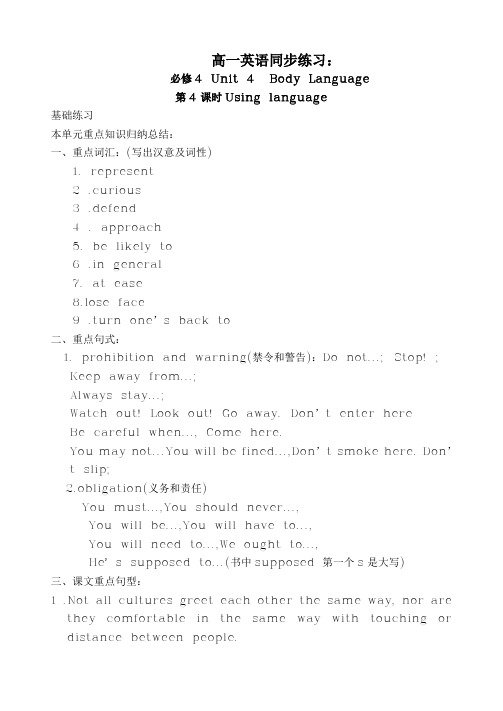
高一英语同步练习:必修4 Unit 4 Body Language第4课时Using language基础练习本单元重点知识归纳总结:一、重点词汇:(写出汉意及词性)1. represent______________2 .curious _______________3 .defend______________4 . approach ______________5. be likely to______________6 .in general______________7. at ease ______________8.lose face ______________9 .turn one’s back to______________二、重点句式:1. prohibition and warning(禁令和警告):Do not...; Stop! ;Keep away from...;Always stay...;Watch out! Look out! Go away. Don’t enter hereBe careful when..., Come here.You may not...You will be fined...,Don’t smoke here. Don’t slip;2.obligation(义务和责任)You must...,You should never...,You will be...,You will have to...,You will need to...,We ought to...,He’s supposed to...(书中supposed 第一个s是大写)三、课文重点句型:1 .Not all cultures greet each other the same way, nor arethey comfortable in the same way with touching or distance between people.1. 各种文化背景下的人互致问候的方式不尽相同,身体接触和相互间距的程度也不尽相同。

牛津译林版英语八年级上册Unit4_study_skills教学设计一. 教材分析牛津译林版英语八年级上册Unit4的主题是“study skills”,主要让学生掌握如何有效地学习。
本节课将介绍一些学习技巧,如如何制定学习计划、如何集中注意力等。
教材中包含一些任务和活动,旨在帮助学生提高他们的学习技能。
二. 学情分析八年级的学生已经具备了一定的英语基础,对于学习技巧也有一定的了解。
但他们在实际应用中可能会遇到一些问题,例如难以制定合理的学习计划,容易分心等。
因此,在教学过程中,需要引导学生认识到这些问题,并帮助他们找到解决问题的方法。
三. 教学目标1.知识目标:让学生掌握如何制定学习计划、如何集中注意力等学习技巧。
2.能力目标:通过各种活动,提高学生的听说读写能力。
3.情感目标:培养学生积极主动学习的态度,养成良好的学习习惯。
四. 教学重难点1.重点:让学生掌握学习技巧,如制定学习计划、集中注意力等。
2.难点:如何引导学生将这些学习技巧应用到实际学习中。
五. 教学方法1.任务型教学法:通过完成各种任务,让学生在实践中学习。
2.合作学习法:鼓励学生互相合作,共同解决问题。
3.情境教学法:创设真实的学习情境,让学生更好地理解和学习。
六. 教学准备1.教师准备:准备好相关的教学材料,如PPT、任务单等。
2.学生准备:提前让学生预习教材,了解本节课的主题。
七. 教学过程1.导入(5分钟)教师通过提问方式引导学生谈论学习技巧,激发学生的学习兴趣。
例如:“你们觉得学习技巧重要吗?为什么?”2.呈现(10分钟)教师通过PPT展示本节课的主题“study skills”,并简要介绍本节课将学习的一些学习技巧。
3.操练(15分钟)教师学生进行小组讨论,让学生分享自己的学习技巧。
每个小组选出一个代表进行汇报,其他小组成员可以进行补充和评价。
4.巩固(10分钟)教师设计一些练习题,让学生通过完成练习来巩固所学内容。



Unit 4 课堂实践教案三:听力口语强化训练随着中国与世界其他国家交流的频率不断升高,越来越多的人开始学习英语。
而在英语学习中,听力口语是不可或缺的两个方面之一。
由于汉语和英语之间的差异,汉语母语者在学习英语听力口语时常常遇到困难。
提高学生的听力口语能力是英语教学中一个重要的目标。
在 Unit 4 课堂实践教案三中,我们将会介绍一种听力口语强化训练的方法,以帮助学生提高他们的英语听力口语能力。
这种方法结合了学生使用学习软件和与同学练习对话两个方面。
让我们来了解一下这个方法的详细步骤。
步骤一:选择适合的学习软件学习软件是提高学生听力口语能力的最佳途径之一。
在市场上有很多不同类型的学习软件可供选择,从背单词到提高口语流利度等等。
在选择软件时,我们应该考虑学生的英语水平和需要,挑选与他们水平相符的软件,这些软件不仅能够帮助他们快速提高听力口语能力,还会提高他们的英语阅读和写作能力。
步骤二:练习对话在学生学习的过程中,与同学练习对话是必须的。
一般来说,我们会对学生组成小组,每个小组包含不同水平的学生。
学生应该与小组中的其他人交换意见和经验,共同提高各自的英语口语能力。
在对话的练习中,教师可以通过个人辅导来指导学生,以帮助他们提高听力口语技能。
步骤三:提高对笔记的管理能力在课堂的训练过程中,学生也应该学会如何好好管理和使用笔记。
笔记可以帮助学生整理他们学习的信息,提高他们的口语和听力能力。
在练习的过程中,教师可以向学生提供笔记的技巧和建议,以帮助他们更好地记忆和运用所学的知识。
步骤四:学习新的单词和短语在加强学生的听力口语能力方面,学习单词和短语也是必不可少的。
在课堂上,教师可以通过游戏和互动的方式,让学生学习新的单词和短语,并鼓励他们在听力和口语练习中多次使用这些单词和短语。
步骤五:提供实战经验为了检验学生实际所学到的技巧和知识,教师可以让学生参加各种口语比赛或其他英语活动。
这样一来,学生将有机会展示他们所学到的英语听力口语能力,并有机会与其他英语学习者分享他们的经验和建议。


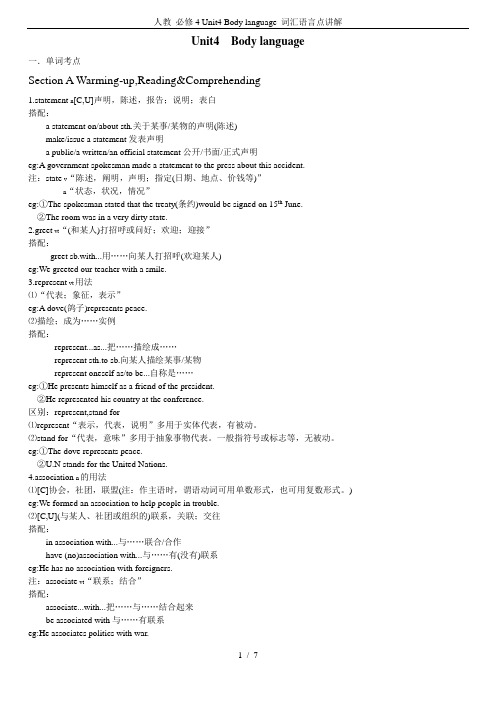
Unit4 Body language一.单词考点Section A Warming-up,Reading&Comprehending1.statement n[C,U]声明,陈述,报告;说明;表白搭配:a statement on/about sth.关于某事/某物的声明(陈述)make/issue a statement发表声明a public/a written/an official statement公开/书面/正式声明eg:A government spokesman made a statement to the press about this accident.注:state v“陈述,阐明,声明;指定(日期、地点、价钱等)”“状态,状况,情况”neg:①The spokesman stated that the treaty(条约)would be signed on 15th June.②The room was in a very dirty state.2.greet vt“(和某人)打招呼或问好;欢迎;迎接”搭配:greet sb.with...用……向某人打招呼(欢迎某人)eg:We greeted our teacher with a smile.3.represent vt用法⑴“代表;象征,表示”eg:A dove(鸽子)represents peace.⑵描绘;成为……实例搭配:represent...as...把……描绘成……represent sth.to sb.向某人描绘某事/某物represent oneself as/to be...自称是……eg:①He presents himself as a friend of the president.②He represented his country at the conference.区别:represent,stand for⑴represent“表示,代表,说明”多用于实体代表,有被动。
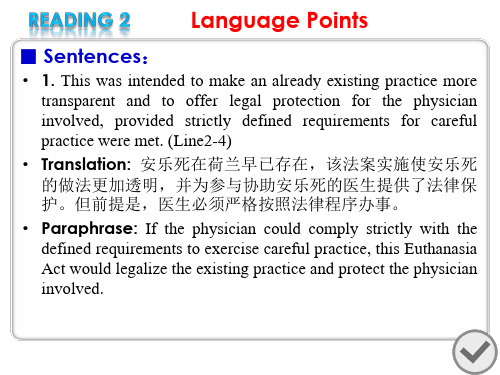

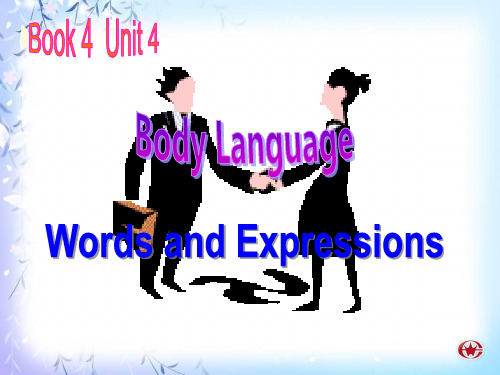



Language study of Unit 4, Book 21.modest adj. 谦虚的;适度的;端庄的eg The more a man knows, the more he is inclined to be modest.【翻译】大智若愚。
eg. I bought the house at a modest price.【翻译】我以适中的价格买下了这所房子。
eg The girl has a quiet, modest demeanor.【翻译】这个女孩子的态度娴静而谦逊。
同根词:modesty n. 谦逊modestly ad. 谨慎地, 适当地【习惯用法】in all modesty 毫不夸张地CF: modest & humble 这两个形容词都有“谦恭的”之意。
modest 含义广泛,指行为或态度等方面不自大、不虚荣、不傲慢、不武断或不自负。
例如:Be modest, otherwise you will lag behind.谦虚些,否则就要落后。
humble 指精神和行为上的谦逊。
褒义指对自己或自己的成就不骄傲;贬义指过低地评价自己,对人低声下气。
例如:Knowledge makes humble; ignorance makes proud.博学使人谦逊,无知使人骄傲。
2. at ease:in a relaxed position 安乐,安逸, 悠闲,放松eg The doctor soon made the worried mother feel at ease.【翻译】医生很快便让焦急的母亲放下心来。
eg With you in charge, I’m at ease.【翻译】你办事,我放心。
Collocation: with ease 轻而易举地;毫不费力地ill at ease 不安;心神不宁(stand) at ease 稍息take one’s ease 使自己舒服一下;休息;放松3. display: vt. Show 显示,表现,夸示n. the act of displaying; a collection ofthings displayed 显示,陈列,炫耀eg The peacock displayed its fine tail feathers when it noticed any gay colors.【翻译】孔雀看到鲜艳的颜色就开屏。
Unit 4 Language Study1. on account of: (fml) because of 由于,因为Examples: The house isn't really suitable for an old person on account of all those stairs.The president declined to deliver the speech himself on account of a sore throat 2. deputy: the second most important person in a particular organization n.副职,副手Examples: A deputy was appointed in case the manager became ill.After several years' hard work he was promoted to deputy manager.3. work up: spend time and effort preparing; produce or develop gradually准备,整理;逐步发展Examples: The head of the department asked me to work up some sample compositions and give them to the students.Let's go for a walk to work up an appetite. (to make ourselves hungry)4. pension: an amount of money paid regularly to someone who can no longer earn (enough) money by working n.退职金;养老金;抚恤金Examples: The employees in many companies put aside money for their retirement pensions.When added to Social Security payments, pensions enable many retired Americans to live comfortably.5. disable: make (a person) unable to use his/her body properly vt.使残废Examples: In that country, the poor and disabled are left to starve on city streets.There are few facilities for the disabled in some cities.Peter became disabled in World War 11.6. veteran: person with much or long experience, esp. as a soldier n. adj.退伍军人(的),富有经验的(人)Examples: By 1955 more than 2 million veterans of World War I1 had used the government financial aid to go to college.Veterans Day was originally established to honor Americans who had served in World War 1.7. complicated: difficult to understand or deal with adj.复杂的难解的Examples: The new computer is too complicated even for a skilled operator to handle.The situation in Afghanistan is so complicated that many people are uncertain what will happen next.8. knock off: (infml) stop working, usu. at the end of a dayExamples: If I get this paper done I'll knock off early today.When do you usually knock off for supper?9. hit the sack: (infml) go to bedExamples: Time to hit the sack; lights out!Louise was so tired that he hit the sack soon after supper.10. go over: examine the details of; check; study carefully仔细检查,核对;研究,考虑;温习Examples; Go over the textbook before you take the examination.The guards go over every passenger at the airport to prevent possible terrorist attacks.11: column: a series of numbers arranged one under the other; a tall pillarExamples: She added up the first column of figures and entered the total at the bottom. n.列;栏,专栏;(园)柱The roof of the temple was held up by a row of stone columns.12. rocket: a tube-like device containing material that bums rapidly and propels the tube through the air n.火箭Examples: American Robert H. Goddard was one of the first scientists to experiment with rocket propulsion systems.13. bug: cause (eyes) to stick out; annoy sb. vt.张大,使突出:打扰Examples: His eyes bugged with horror.The naughty kid from next door put a frog in my mailbox, which really bugged me.Don't bug me with petty details.14. have sth. on: be wearing sth.Examples: Our teacher has got a tie on today.He has a new T-shirt on.15. alike: similar; in the same manner (a., ad.) adj. adv.相同的(地),相似的(地)Examples: Teachers are required to treat all their students alike.She and her cousin look very alike.16. observation: the act of watching attentively n.观察,观测Examples: Observation plays an essential part in the traditional Chinese medical practitioner's diagnoses.The woman didn't have any major injury but was kept in hospital under observation.17. locality: a particular place; the position of sth. n.地点;位置Examples: People living in this locality complain of traffic noises disturbing them at night.Having lived in California for about ten years, they moved to another locality. 18. isolate: set apart; cut off from others vt.使隔离;使孤立Examples: When I'm angry, I find it best to isolate myself from other people for a little while.In the early decades of its history, the United States was relatively isolated from Europe and other parts of the world.It would certainly be unnatural for someone to totally isolate themselves,19. adopt: take over and use as one's own; take into one's family and make legal son or daughter vt.采用;收养Examples: Some immigrants discarded their old customs and adopted American ways.Several private international organizations have adopted standards for consumer protection in electronic commerce.The Red Cross has adopted a lot of homeless children in Afghanistan.20. mode: a manner, way or method of doing n.方式,模式,样式Examples: You'll have to change your mode of life once you have a baby.Railways are the most important mode of transport for the economy.21. appearance: the way that sb./sth, looks; an act of coming into sight n.外藐;出现Examples: Women's magazines were full of ideas on how to make the best of one's appearance.The manager gave every appearance of being a very dedicated employee.The singer made her first appearance in Vienna.22. go for: be attracted by; like or preferExamples: What sort of men do you go for?Many young people go for pop music.23. blink: shut and open the eyes quickly; flash on and off v.眨(眼);闪烁Examples: Staring for hours at a computer screen dries out the eyes as people blink less.We could see lights blinking on the ships out in the bay.24. regardless of: without worrying about or taking account of 不顾;不管Examples: Medicare, another form of federal health insurance bills for the disabled, regardless of age.Each state has two senators, regardless of population.25. nationality: the state of belonging to a particular nation; people who belong to a nation n.国籍;民族Examples: Her father is an American. Her mother is an Italian. What nationality is she?Many different nationalities went to the US.26. at one's service: willing to help sb. 愿意为某人效劳Examples: If you need any help, I'm at your service."Would you fetch me my glasses from the kitchen, Rose?" "At your service, madam?'27.arrangement: plan; preparation (usu. pl, followed by about/for) n.安排Examples; The company tried to make flexible work arrangements so that it would make the best of all its employees.The president doesn't want any special arrangements for her visit.The personnel department only called me, but made no arrangements to see me. anization: a group of persons grouped together or organized for some purpose or work n.组织,机构,团体Examples: The European Union, the biggest US trade partner, prepared a protest to the World Trade Organization (WTO).the World Health Organization (WHO)the North Atlantic Treaty Organization (NA TO)29. supreme: greatest in power, rank or degree adj.最高的;极度的Examples: The Supreme Court meets in Washington, D.C., and the other federal courts are located in cities throughout the United States.They argued that the Security Council was the supreme authority and the GeneralAssembly had in fact no right to authorize peacekeeping activities.30. go to pieces: If you go to pieces, you are so upset or nervous that you lose control of yourself and cannot do what you should do.Example; Anne is a strong woman, but she nearly went to pieces when she heard her colleague died in the car accident.31. come around: visit someone at their houseExamples: Halfway through the party, a neighbor came around to complain about the noise.Why didn't you come around while you were in Beijing on business?32. leave ... alone: allow one to be by oneself; allow sb. or sth. to remain untouched or unchanged 不打扰;听其自然Examples: It's useless to talk to her since she is so upset; just leave her alone.I told you to leave that vase alone -- now you've broken it.33.garbage: nonsense; rubbish; Examples: Peter was talking a lot of garbage about education. n. 废话;垃圾,废物Family members hauled bags of trash out to the garbage can, and, once or twice a week, collection crews would dump them into a garbage truck.34.... everything they said was so.: ... everything they said was true. …他们说的句句是实话35. heave: raise or lift with great effort v.举起;升起Examples: They had to heave the piano onto the stage.The teacher heaved Mary to her feet and took her to the office.36. wit: (also wits) quick understanding, intelligence n.智力,才智,智慧Examples: He lacked the wit to respond in time.Peter hadn't the wits to realize the danger,The policeman used his wits more than his gun to tame the local criminals.37. make like: (infml) act as if one were; pretend to he (used in the patterns: make like sb./sth, make like + clause) 假装;装扮作Examples: The old man made like a monkey to amuse the children.Bob made like he was a fish blowing bubbles.39. knock down: 1) cause someone to fall to the ground by pushing or hitting them 撞倒;拆毁Examples: The old man died in hospital after being knocked down by a car.The driver was in serious trouble for knocking down a pedestrian on a pedestrian crossing.2) destroy and remove sth.Examples: The house is being knocked down to make way for a new road.We're planning to knock the dividing wall down so as to make one large room.40. catch sight of: see for a moment 一眼看见,暼见Examples: I caught sight of her just as she turned the comer and disappeared.I happened to catch sight of John as he was going past our office.41. fade out: disappear gradually 逐渐消失Examples: As it was getting colder and colder, their enthusiasm for doing sports in the morning faded out.My daughter's interest in drawing has now almost completely faded out.。